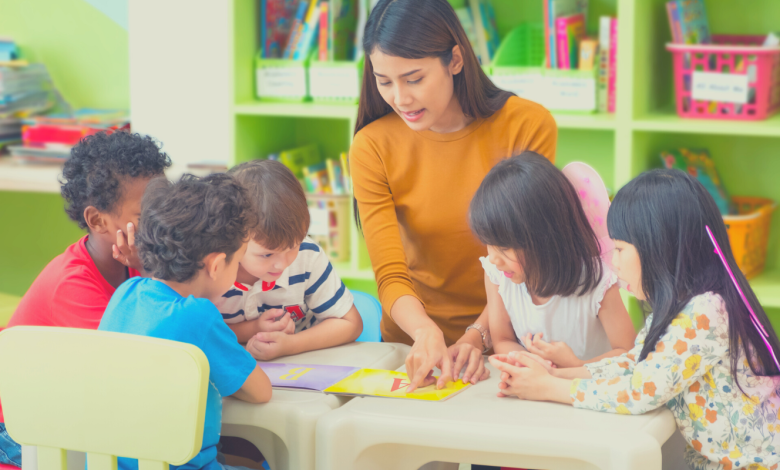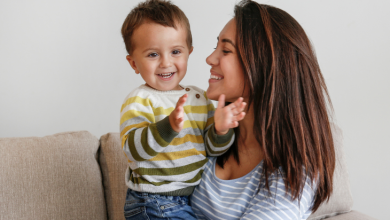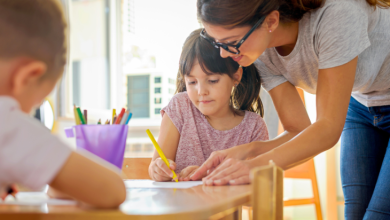How to Help Your Preschooler Transition to Kindergarten

How to Help Your Preschooler Transition to Kindergarten
Starting kindergarten can be both exciting and frightening for your child, and parents are often just as anxiety-ridden as their preschoolers when it comes to this major milestone. To ease the anxiety, there are a variety of things you can do to help make your preschooler’s transition to kindergarten a smooth one.
Do a Dry Run
One of the easiest ways to help ease your child into attending kindergarten is to do a dry run. Visit the school ahead of the first day—even when the school is closed—just to familiarize your child with the location. If there is a designated day before the official first day of school to meet teachers and faculty, be sure to bring your child along to participate. If your child’s school does not offer a “meet the teacher” day, contact school administrators to see if you can schedule a time to meet with your child’s teacher and other faculty before school begins.
Also, a week or two ahead of the first day of school, begin to adjust your daily and nightly routines to get your child familiarized with what will be expected of them during the school year. Adjust bedtimes, mealtimes, and daily routines to get your child accustomed to their new schedule.
Beat First-Day Jitters
It is natural for children as well as parents to be nervous the first day, so using strategies to beat first-day jitters is critical. Always remain positive, because you will be leaving your child for the day and this is likely to cause some nervousness. Refrain from getting overly emotional when saying goodbye at the bus stop or the school and reassure your child that you will see them at the end of the day. Also, be sure to describe school in a positive way and reiterate that this will be a great experience.
To further cut down on first-day jitters, avoid any behaviors that could trigger anxiety or upset your child such as crying, being argumentative with teachers or bus drivers, or disagreeing with your child over meals or fashion choices. Encourage your child to eat a healthy breakfast on the first day of school but do not fret if their appetite is not as hearty as normal.
Get to Know the Teachers
Aside from doing a dry run, you will want to remain in regular contact with your child’s teacher, especially during the first few weeks of school. At the beginning of the school year and throughout, teachers will likely send home a lot of information in your child’s backpack, which will include important school events, meetings, and other information. Be sure to check your child’s backpack daily and review with your child the information you receive.
Keep the lines of communication open with teachers, and if any issues come up, be sure you have their contact information on hand. If any concerns arise, do not hesitate to set up a meeting with the principal or teacher to discuss and resolve issues.
Keep Communication Open
One of the best ways to ease the transition to kindergarten is to discuss any fears or insecurities your child may have about starting school. Talking to your child provides good insight into how your child feels and allows you to help them manage their stress. After each school day, always ask how your child’s day went—if they are having a hard time, try to get to the bottom of the problem.
A lot of children are very vocal about their dislikes about the school, but others may take some prodding to get them to open up. Always let your child express what is frustrating them and try not to project any of your fears onto them. Let your child talk openly about things so you can help them come up with practical solutions. Your child may be prone to ask more questions in the first few weeks of school, so answer them as best you can.
Ask them what they’ve learned and how they feel the school is helping them, if they’ve made any new friends, or if there are any activities they particularly enjoy at school. Keeping communication open can help ease the stress of transitioning to kindergarten.
Making Kindergarten an Exciting Time
Kindergarten is undoubtedly a big change for many children, and for those who did not attend a pre-kindergarten program, it will be their first experience in a structured learning environment.
Transitioning to kindergarten can be especially stressful for children who have no other school experiences as they will be expected to develop social skills, as well as practical skills like reading and writing, all while being expected to follow classroom rules. Always express excitement when discussing the type of things that they can expect in the kindergarten classroom, as this will help your child mentally prepare for one of the most exciting and educational times of their life.





